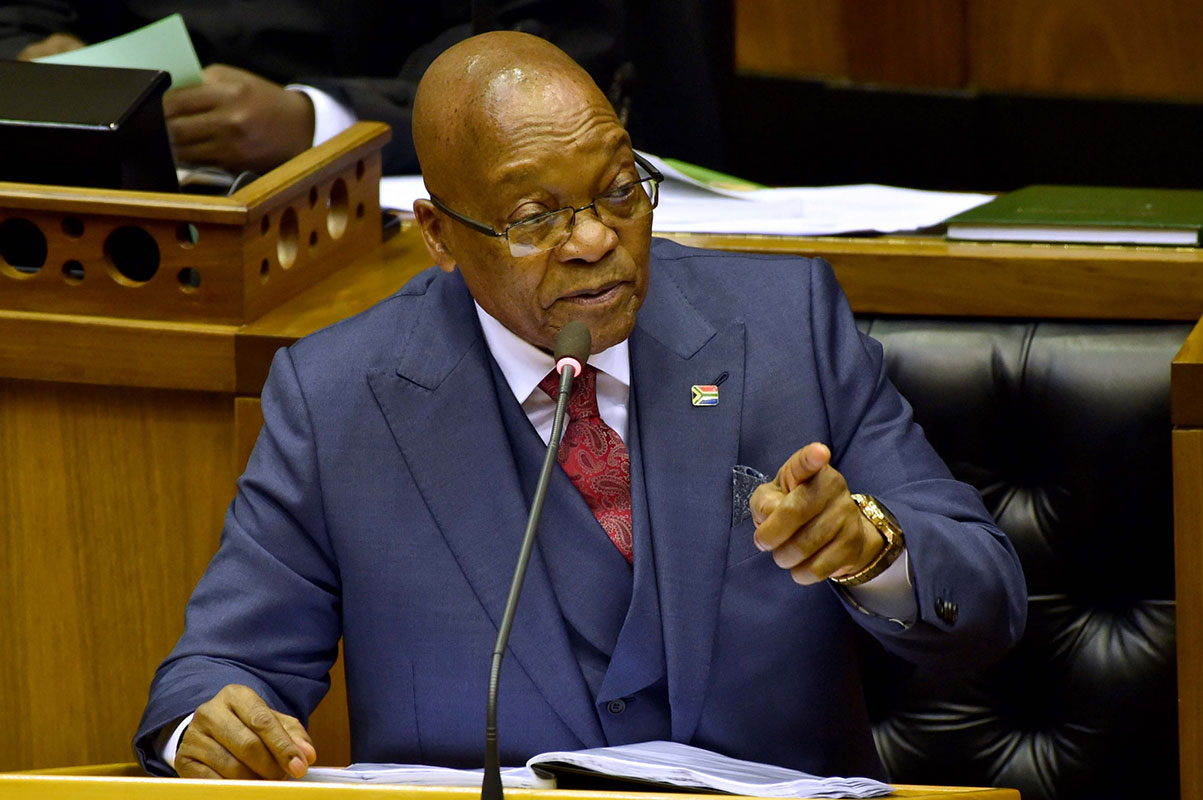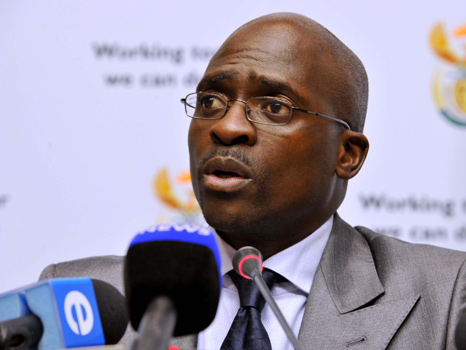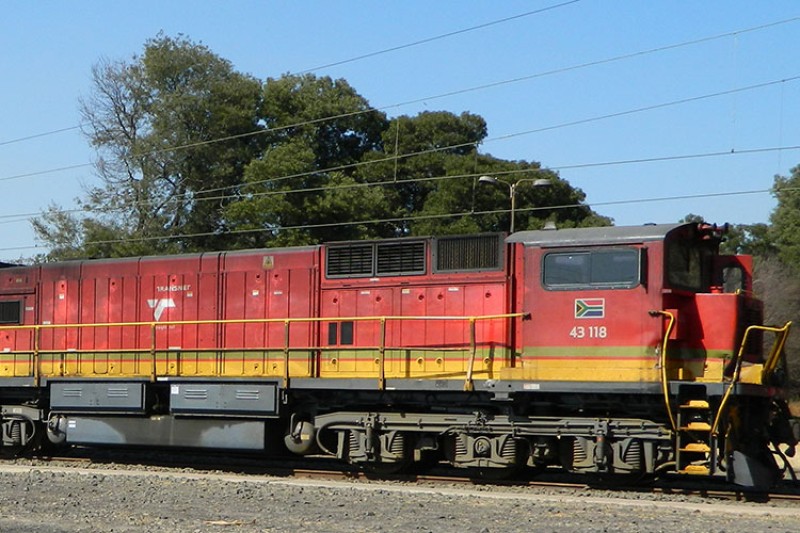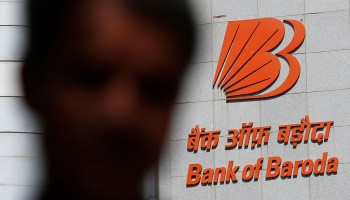On the surface, the contract referred to a big, seemingly conventional deal in which China South Rail, a state-owned Chinese manufacturer, would deliver locomotives to South Africa’s state-owned transport infrastructure firm, Transnet.
China South Rail’s contract for 359 locomotives was worth a whopping US$1.5 billion.
But this was no straight deal.
Behind the contract were associates of South Africa’s wealthy and politically connected Gupta family, which has been implicated in an ambitious financial raid on Transnet, as previously reported by OCCRP. The Guptas have close ties to South African President Jacob Zuma, whose son, Duduzane Zuma, is on their payroll, and they are well known for giving perks to other public officials and receiving favors in return.
The contract shows China South Rail promising to pay $321 million as an advisory fee to Salim Essa, an alleged front man and proxy for the Gupta family.
For that fee -- which represented an astounding 21 percent of the total contract -- the Chinese identified Tequesta, Essa’s Hong-Kong-registered advisory firm, as providing it with “Black Economic Empowerment” assistance. (All foreign investment in South Africa needs this designation, intended to correct the economic imbalances of the apartheid regime that ended in 1994.)
The fee was to be paid under an unusual arrangement spelled out in the contract that required Transnet to cover the cost. In short, the fee appears to be structured like a kickback to the Gupta empire that is funded by South African taxpayers.
Banking records obtained by the Organized Crime and Corruption Reporting Project (OCCRP) trace a total of $75 million paid out by China South Rail after the contract was signed and $39.8 million in the three months prior to that. OCCRP did not have access to all records to track the full $321 million in payments.
The documents show that the money went first to Gupta-associated companies and then on to a series of small shell companies where much it disappeared. But some is traceable to payments on everything from coffee to luxury cars. Bankers often failed to flag a suspicious scheme, accepting large payments from the Chinese rail firm and then paying out a series of smaller payments to an array of shell companies controlled by the Guptas.
After all this, South African taxpayers suffered the indignity that the first two locomotives that arrived in the country in early 2017 turned out to be defective. They never ran.
 South African President Jacob Zuma (Photo: GovernmentZA, CC BY-ND 2.0)
South African President Jacob Zuma (Photo: GovernmentZA, CC BY-ND 2.0)
Fixers
According to the contract, Tequesta, the Gupta-connected firm run by Essa, got an advance of ($60 million), which represented 3.9 percent of the contract before it was even signed. The rest was to be paid from money Transnet sent to China South Rail, which would then pay a portion of it on to Tequesta, or any other entity of Tequesta’s choice.
As the contract put it, “Each time the company [China South Rail] receives a payment from the client [Transnet] as a percentage of the total contract value, same proportion of the advisory fee will be paid to Tequesta.”
If Transnet stopped paying or reduced payments, the contract stipulated, Tequesta would get zero or reduced fees.
The banking data reveals that a total of $114.6 million was paid out by China South Rail in some 42 transactions. About $49 million was sent to Tequesta’s HSBC account between June and October 2015. The remaining $65 million went into the HSBC account of a Hong Kong company called Regiments Asia, also throughout 2015.
In response to reporters’ inquiries, HSCB representatives wrote that "HSBC simply has no desire to do any Gupta-related business. To the best of our knowledge, HSBC previously exited, is in the process of exiting, or never had a banking relationship with Tequesta, Regiments, ... [and persons such as] Mr. Salim Essa ... or other members of the Gupta family, and other Gupta-related entities we have become aware of through the media or otherwise."
Regiments Asia (of which Essa is a cofounder) and Tequesta are partners that share many of the same principals. The two firms were established on the same day, June 20, 2014, they share the same Hong Kong address.
According to whistleblower information provided to OCCRP, another alleged cofounder of Regiments Asia, Eric Wood, was at the time a shareholder in Regiments, Transnet’s South African financial partner. (OCCRP recently reported a separate scheme in which Regiments and another firm overcharged Transnet for millions in unnecessary loan rate swaps.)
Via his communications company, Grit, Wood told OCCRP that he knew nothing about any of this. "Mr Wood … unequivocally and categorically states that he has no knowledge of Regiments Asia" or any of the other companies mentioned.
A familiar pattern
Moving assets in this way, through confidential contracts and multiple shell companies, along with the use of well-placed allies in the government, is a Gupta specialty.
“Guptaleaks” is the name given to a recently published collection of Gupta business documents that came from a whistleblower. The emails and documents show Wood and the Guptas colluding with Transnet insiders to ensure that its rail supplier contracts went to companies of their choosing. China South Rail was one of those chosen.
 Malusi Gigaba, then Minister of Public Enterprise, announces the appointment of Brian Molefe as Chief Executive of Transnet in 2011. (Photo: GovernmentZA, flickr) One of their insider allies was Iqbal Sharma, another Gupta associate and Essa’s business partner, who was appointed to several senior Transnet positions. He was named to the company’s board in late 2010 by then-Minister of Public Enterprise Malusi Gigaba, who has held a number of senior positions by appointment of President Zuma. By 2013 he had become chairman of Transnet’s Board Acquisition and Disposal Committee alongside Anoj Singh, then the company’s chief financial officer and since exposed as another Gupta associate, according to a report by South Africa’s former Public Protector.
Malusi Gigaba, then Minister of Public Enterprise, announces the appointment of Brian Molefe as Chief Executive of Transnet in 2011. (Photo: GovernmentZA, flickr) One of their insider allies was Iqbal Sharma, another Gupta associate and Essa’s business partner, who was appointed to several senior Transnet positions. He was named to the company’s board in late 2010 by then-Minister of Public Enterprise Malusi Gigaba, who has held a number of senior positions by appointment of President Zuma. By 2013 he had become chairman of Transnet’s Board Acquisition and Disposal Committee alongside Anoj Singh, then the company’s chief financial officer and since exposed as another Gupta associate, according to a report by South Africa’s former Public Protector.
Singh was also key to the Guptas’ efforts to influence Transnet. In fact, Transnet’s tender for the locomotives came out in July 2012, the same month he was appointed.
In his crucial position, Sharma was in close contact with the Guptas and Wood as Transnet moved forward on the locomotive tender. As the Guptas’ insider within the company, he was instrumental in steering the state firm’s decisions in a way that made the scheme possible.
The Guptaleaks emails also show that Woods and the Guptas had access to a confidential internal Transnet document that spelled out the procurement criteria for the tender.
In the fall of 2014, media reports were beginning to point to the Guptas’ influence on state entities, including Transnet. In response, the company hired PricewaterhouseCoopers (PwC) to carry out an investigation.
That November, according to Guptaleaks documents, PwC had identified multiple Gupta-linked companies in which Sharma “might have” a conflict of interest because of his involvement in companies that benefited from deals with Transnet.
Sharma’s own company, VRLS, also linked to Essa, was financially integrated into the Guptas’ corporate empire, according to documents in OCCRP’s possession. Meanwhile, Tequesta itself gave the company a multi-million-dollar loan, according to Tequesta’s September 2014 balance sheet, also obtained from Guptaleaks.
Yet the Guptas’ influence continued. The following year, in a memo obtained by OCCRP, Transnet retained Regiments to raise $800 million it needed to pay for the locomotives. (See: Guptas, Nedbank skillfully extract money from South African state firm)
Transnet ultimately wanted to buy a total of 1,064 locomotives; the Chinese-owned firm’s ultimate allocation would soon increase from 359 to over 500.
Early in 2017, the first two of the locomotives were delivered and found to be unusable. While acknowledging “glitches,” Transnet said that those two locomotives were simply prototypes. It is not known when delivery of the remaining locomotives is to take place.
Round and Round
China South Rail sent the locomotive deal “fee” to Regiments Asia and Tequesta in chunks ranging from $100,000 to several million dollars.
The bank data shows that, whenever Regiments Asia received a credit to its account, it was always from China South Rail -- suggesting that the firm had been established precisely for this deal. Tequesta records show a similar pattern, with 90 percent of its money coming from China South Rail.
But the money didn’t stay with the two shell firms for long. The millions then went through more than three dozen shell companies around the world, mostly using HSBC accounts in Hong Kong and other locations, but also employing other banks in London, Johannesburg, Dubai, and the US.
Regiments Asia paid more than $100 million from its account to shell companies that appeared to have no substantive business activity, employees, or even physical offices. These companies, bearing names such as Gallenade, Success Stand, Shun Shi, Honorway, Bestway, PAI, Al Malaki, Vogen, Daya and Flybright, received money, sometimes almost daily, from late 2014 through February 2017, with the bulk arriving in 2015. Tequesta paid out over $60 million to the same shell companies.
Gupta family members received some of these funds directly in transactions flagged as problematic by big banks’ compliance departments.
In all, OCCRP data shows that more than 20 banks sent or received money from Regiments Asia, Tequesta, or the shell companies. Led by HSBC, these banks also included National Westminster in the United Kingdom, Wells Fargo in the US, India’s state-owned Bank of Baroda, Habib Bank, Standard Chartered Bank, and a dozen Chinese banks like Bank of China and China Citibank. Often, the transfers were listed as “commissions.”
Flows from one key conduit in South Africa, a shell company called Homix, were so vast that the account was shut down by its bank, Mercantile Bank, after just 11 days. During that time, the company -- which was allegedly run by Essa’s legal advisor Ashok Narayan – sent $8.4 million to Morningstar International, a Gupta-controlled firm in Hong Kong.
Big banks like the Bank of Baroda and HSBC allowed the payments to carry on from 2014 until 2017. Mercantile, however, noticed suspicious activity within four working days of the account being opened. Its bankers reported this to the South African Reserve Bank, which requested that Mercantile block the account, which it did.
Like the other shell companies in the scheme, Homix appeared to have no substantive business activity or employees. But each remittance it sent to Morningstar had an instant consequence. For instance, on May 27, 2015, at precisely the time that Homix sent two payments to Morningstar International Trade, that company moved similar amounts to Gallenade and Billion Lucky. On the next day, the same pattern was repeated.
After Mercantile shut down the Homix account, and perhaps unknown to the bank, other nominees stepped in to serve as new conduits for Morningstar.
Some of the Morningstar funds ended up in the US with a company called MNT Trading, which received transfers from Morningstar’s Hong Kong account in its account at Wells Fargo.
Between Tequesta and Regiments, more than $160 million was moved through international banks led by HSBC and Bank of Baroda.
A host of transactions by the Guptas, such as buying luxury cars, groceries, or even coffee and bagels at Pret-a-Manger in London, were also flagged as suspicious by the compliance departments of several big banks.
But the flagging appeared to make no difference, and the transfers continued.
South Africa’s Parliamentary Portfolio Committee on Public Enterprises has investigated the influence of the Guptas on the country’s state-owned entities, including Transnet. But there has been little scrutiny of institutions such as the Bank of Baroda, HSBC, and other banks that helped them, keeping transaction fees for themselves. In fact, transactions considered “risky” -- such as the large flows described here – brought the banks higher fees.
No Comment
China South Rail could not be reached at the time of publication.
Essa did not respond to reporters’ questions.
Wells Fargo declined to comment, citing client confidentiality.
Habib Bank did not respond to questions concerning Essa’s account.
Regiments categorically denied knowing anything about Regiments Asia and said its relationship with Transnet was “duly mandated,” meaning legal.
Sharma told OCCRP that he “did not act improperly at any time during [his] time on the board of Transnet."
Transnet did not comment to questions about the validity of the locomotive contract, the role of Regiments, Regiments Asia, and Tequesta, or the commissions worth $114.6 million that OCCRP identified.
Time stamps show that all emails asking for explanations were opened and viewed.
This story is part of the Global Anti-Corruption Consortium, a partnership between OCCRP and Transparency International. For more information, click here.
It was supported by Trust Africa, a non-profit organizaton supporting investigative journalism and advocacy.






